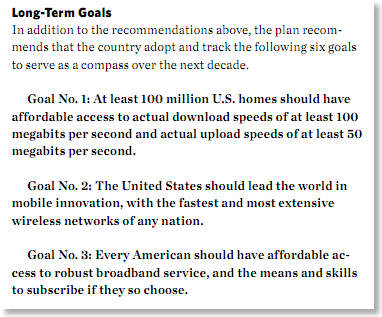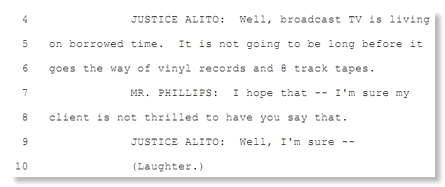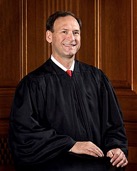"Broadcast TV is living on borrowed time" -- Justice Alito
JUSTICE ALITO: Well, broadcast TV is living on borrowed time. It is not going to be long before it goes the way of vinyl records and 8 track tapes.
MR. PHILLIPS: I hope that -- I'm sure my client is not thrilled to have you say that.
JUSTICE ALITO: Well, I'm sure -
(Laughter.)
JUSTICE ALITO: I'm sure your clients will continue to make billions of dollars on their programs which are transmitted by cable and by satellite and by internet. But to the extent they are making money from people who are using Rabbit ears, that is disappearing. Do you disagree with that?
MR. PHILLIPS: No, I -- it would be -- you know, obviously not, because that's why we are not uniquely accessible or uniquely pervasive.
JUSTICE ALITO: Yeah. So why not let this die a natural death? Or why do you want us to intervene -
(Laughter.)
The two mentions of “laughter” in the transcript clearly show the crowd was enjoying this line of discussion at the usually staid Supreme Court. Perhaps only a judge with lifetime tenure - as long as Newt Gingrich or Rick Perry don’t change the Constitution - could say something like this. FCC commissioners and members of Congress are clearly too intimidated by the broadcast lobby to even raise the issue.
Consider the following goal statement from the National Broadband Plan:

This establishes as a long term goal that “at least 100 million U.S. homes should have affordable access to actual download speeds of at least 100 megabits per second.” Essentially Title II universal service goes from being a “black phone” to 100 Mbps broadband for at least a third of the population. For reference, over-the-air HDTV is 18 Mbps per channel although a given video signal is less since the bandwidth usually is shared with more than 1 video stream. If everyone in an area had 100 Mbps service with “affordable access”, why do we need over-the-air TV with “rabbit ears”?
Now NAB would quickly say we need “rabbit ears” to serve poor people who can’t afford MVPD. This assumes that MVPD has the same pricing model it has today which of necessity would change in the NBP-envisioned universal service. For example, the money raised from recycling the VHF and UHF spectrum, “digital dividend” in Eurospeak, could be used to endow low cost or free broadband service to the economically disadvantaged. Alternatively, MVPDs could switch to a “freemium” pricing model with present over-the-air channels free and charge for the traditional cable channels.
What is truly amazing is the unwillingness of public officials, except Justice Alito, to talk about these long term options.





![Validate my RSS feed [Valid RSS]](valid-rss-rogers.png)

